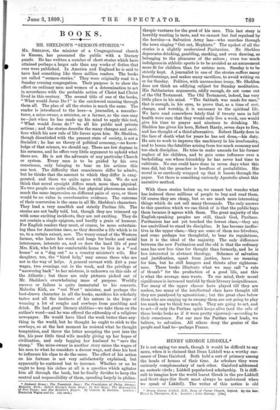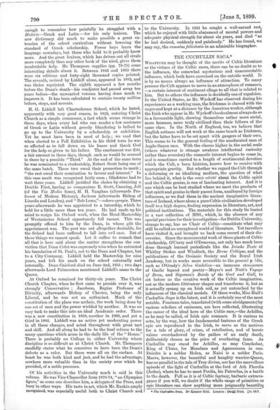HENRY GEORGE LIDDELL.* IT is not saying too much, though
it would be difficult to say more, when it is claimed that Dean Liddell was a worthy suc- cessor of Dean Gaisford. Both held a sort of primacy among the heads of houses of their time. As scholars they • were curiously complementary of each other. Gaisford addressed an esoteric circle ; Liddell popularised scholarship. It is diffi- cult to imagine how the world learnt Greek in the pre-Liddell and Scott days (for Scott must always be understood when we speak of Liddell). The writer of this notice is old • Henry George Liddell, DD., Dean of Christ Church, Oxford. By the Bey. Henry L. Thompson, XL. London : John Hurray. [lea.] enough to remember how painfully he struggled with a Hederie—Greek and Latin —for his only lexicon. The new dictionary did much to make possible a great ex- tension of the school curriculum without lowering the standard of Greek scholarship. Fewer boys learn the language nowadays, but those who hold to it probably know more. And the great lexicon, which has driven out all rivals more completely than any other book of the kind, gives them incalculable help. Mr. Thompson supplies (pp. 78-79) some interesting. details about. it. Between 1843 and 1869 there were six editions and forty-eight thousand copies printed. The seventh, revised by Liddell alone, appeared in 1883, and was thrice reprinted. The eighth appeared a few months before the Dean's death—his coadjutor had passed away ten years before—the unwearied veteran having done much to improve it. It has been calculated to contain twenty million letters, stops, and accents.
H. G. Liddell left Charterhouse School, which he hated, apparently with very good reason, in 1829, entering Christ Church as a simple commoner, a fact which seems strange in these days, when every lad who can render a few sentences of Greek or Latin without grossly blundering is bribed to go up to the University by a scholarship or exhibition. Yet he must have been in need of help ; we read that when elected to a Fell Exhibition in his third term he was so affected as to fall down on his knees and thank God for the help so given to his father. The emolument was £40, a fair amount in those days, though such as would be scorned in these by a possible "Third." At the end of the same term he was nominated to a studentship, Robert Scott being one of the same batch. These two owed their promotion to merit ; "the rest owed their nomination to favour and interest." In this case merit was recognised fairly soon ; Gladstone had to wait three years. Liddell justified the choice by obtaining a Double First, having as companions R. Scott, Canning, Jelf (of the Via Media fame), H. H. Vaughan (afterwards Pro- fessor of Modern History), Jackson (afterwards Bishop of Lincoln and London), and " Bob Lowe,"—coltors egregia. Three years afterwards he was appointed to a tutorship, which he held for a little more than ten years. He had made up his mind to resign his Oxford work, when the Head-Mastership of Westminster School opportunely fell vacant. This was promptly offered to him by the Dean, in whose gift the appointment was. The post was not altogether desirable, for the School had been suffered to fall into evil case. But of these things we cannot speak. Let it suffice to remark that all that is here said about the matter strengthens the con- viction that Dean Colet was supremely wise when he entrusted his foundation of St. Paul's, not to the Dean and Chapter, but to a City Company. Liddell held the Mastership for nine years, and left his mark on the school externally and internally. Dean Gaisford died on June 2nd, 1855 ; two days afterwards Lord Palmerston mentioned Liddell's name to the Queen.
At Oxford he remained for thirty-six years. The Christ Church Chapter, when he first came to preside over it, was strongly Conservative ; Jacobson, Regius Professor of Divinity, afterwards Bishop of Chester, being the only Liberal, and he was not an enthusiast. Much of the constitution of the place was archaic, the work being done by one set of men and the power wielded by another. It was no easy task to make this into an ideal Academic order. There was a new constitution in 1858, another in 1866, and yet a third in 1882. Liddell was an active yet moderating power in all these changes, and acted throughout with great tact and skill. And all along he had to be the final referee to the many questions which arose in the daily life of the " House." There is probably no College in either University where discipline is so difficult as at Christ Church. Mr. Thompson candidly states what he conceives to have been the Dean's defects as a ruler. But these were all on the surface. At heart he was both kind and just, and he had the advantage, nowhere more valuable than in the society over which he presided, of a noble presence.
Of his activities in the University much is said in this volume. He was Vice-Chancellor from 1870-74, "an Olympian figure," as some one describes him, a delegate of the Press, and busy in other ways. His taste in art, which Mr. Ruskin amply recognised, was especially useful both to Christ Church and to the University. In 1891 he sought a well-earned rest, which he enjoyed with little abatement of mental powers and adequate physical strength for about six years, and died "as he had desired, suddenly and painlessly." He has found, we may say, the cumulus felicitatis in an admirable biographer.







































 Previous page
Previous page